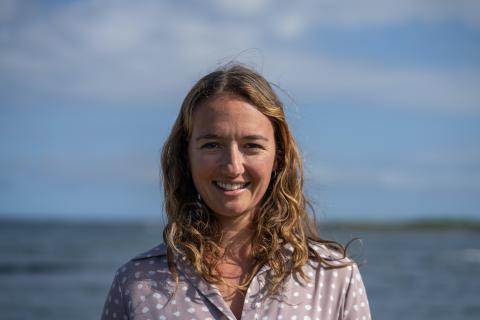
Natalie Lord is pursuing her master’s degree in environmental conservation and sustainability and plans to apply her skills and knowledge to a career in marine science management. She is a part of the Environmental Policy, Planning and Sustainability (EPPS) Lab headed by Catherine Ashcraft, assistant professor in the department of natural resources and the environment.
You can check out photos and narratives from the women who contributed to Natalie’s research on the role of gender in the seafood industry workforce here.
Natalie Lord: Fisheries and aquaculture was historically male-dominated due to cultural norms of masculinity for the industry as a whole. These norms include anything from superstitions of women being bad luck on boats, to women not being strong enough to take on the job of harvesting on the water. Due to these gender norms, women have been often overlooked in this industry. But globally, women are present at every sector of the seafood system, and they make up half the workforce. Their contributions are often unrecognized and not included in data collection because the majority of the roles they hold are in the downstream sectors of the food system in processing, distribution, and marketing. These are not leadership positions. Women are underpaid (if paid at all) and these roles provide very little opportunity for upward mobility, with virtually no decision-making capabilities.
My research objectives are to (1) share stories about women’s experiences as oyster farmers, (2) identify barriers and opportunities for their participation in this sector by analyzing how social networks influence their success and (3) make recommendations for gender integration into local aquaculture policy. The overall goal is to support women’s participation in the industry and improve our knowledge of pathways into these roles so that other marginalized groups can enter the industry and have equal opportunity to start a business and be a part of the coastal economies here in New England. By addressing gender equity, we can increase productivity, promote economic stability, and build a more sustainable marine food system here in New Hampshire.
Natalie: Globally, aquaculture is the fastest growing food production system. Here in the U.S., aquaculture development is a federal priority and is recognized as a means to address food security and domestic seafood demand with sustainable practices. The lack of demographic data collection, such as gender, perpetuates a culture in the seafood industry that fails to acknowledge women's contributions.
"If we truly want a sustainable seafood system, we must recognize the humans who are responsible for bringing seafood to our tables and this research hopes to contribute to that process."
This research is important because it addresses the social dimensions, such as equity for food system workers, that have previously not been integrated with the environmental and economic components of the industry's sustainable development. If we truly want a sustainable seafood system, we must recognize the humans who are responsible for bringing seafood to our tables and this research hopes to contribute to that process.
Natalie: In the survey portion, I analyzed access to resource and experiences of barriers in oyster aquaculture production in Maine and New Hampshire through a gendered lens. I found that 41% of women survey participants indicated that gender has impacted their work experiences in the industry, compared with 0% of men.
Voices of Women Oyster Farmers
- "I have found working with women particularly rewarding because we have an aptitude for finding unconventional ways to get things done and we expect to help each other by towing the same line, pulling the same cage." — Joanna Fogg, Bar Harbor Oyster Company
- "I would like to know one day that there are just as many female boat owners and commercial female fishermen as males but for now I’ll keep enjoying the authentic conversations at the dock. I take pride in being different than the norm. As silly as it sounds, I am helping to pave the way for other women one interaction at a time." — Alicia Gaiero, Nauti Sisters Sea Farm
Gender discrimination can reinforce the practices of gender inequality, limit women’s safety at work and diminish their ability to make entrepreneurial advancements in the industry. Women may have less access to the larger institutional funding and training opportunities, which is why they are more reliant on informal social networks to access knowledge and capital. Seventy-five percent of women participants acknowledged the challenges of gaining access to capital for their oyster farms.
In the photovoice case study, women participants face occupational health and safety issues, gender harassment and discrimination and challenges with industry standard gear types and growing methods. The participants often choose to work directly with other women on their farms to collaborate and challenge the gender norms of the maritime industry. These results call for continued research on the topic of gender for all participants in the sector, as it is an important social component to analyze for system-wide sustainability for aquaculture production in New England.
Learn more
Natalie: My work contributes to an emerging research area of gender equity in marine food systems and will make a strong advancement to the social science field by integrating gender and social-ecological frameworks. My engaged research strategy encourages partnerships, collaborations, and a shared perspective of women aquaculture producers in Maine and New Hampshire. By creating a baseline of information, the industry can make decisions about what steps may be needed to advance justice, and, if needed, foster opportunities and access more equitably across genders within the aquaculture industry.
Natalie’s work is supported by New Hampshire Sea Grant, Robert and Patricia Switzer Foundation, EPPS Lab members and committee members Catherine Ashcraft, Julia Novak-Colwelland Lindsey Williams.